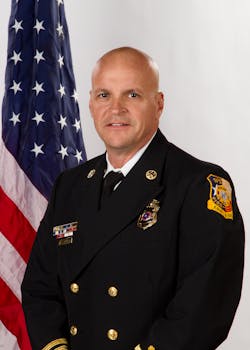Willis and Willingham: Key Recommendations to Improve Arson Investigation
This is the last of four columns focusing on two arson cases in Texas, Willingham and Willis, and urging those who may be charged with investigating similar cases in the future to be as well prepared and able to defend their findings as possible.
This column deals with the April 15, 2011, Texas Forensic Science Commission’s 800-page report and specifically the 17 recommendations reviewers generated designed to improve arson investigations in Texas.
These include:
- Adoption of National Standards
- Retroactive Review
- Enhanced Certification
- Collaborative Training on Incendiary Indicators
- Tools for Analyzing Ignition Sources
- Periodic Curriculum Review
- Involvement of State Fire Marshal’s Office in Local Investigations
- Establishment of Peer Review Group/Multidisciplinary Team
- Standards for Testimony in Arson Cases
- Enhanced Admissibility Hearings in Arson Cases
- Evaluating Courtroom Testimony
- Minimum Report Standards
- Preservation of Documentation
- Dissemination of Information Regarding Scientific Advancements
- Code of Conduct/Ethics
- Training for Lawyers/Judges
- Funding
Although all these areas give fire investigators opportunity to improve fire investigations for the sake of the discipline, following are the recommendations I believe to be the most relevant in the short term and the most easily implemented without resources that exceed what departments may already be expending.
1. Reviewers recommend guiding documents like NFPA 921 and NFPA 1033 among others. These documents serve as models to follow, which in turn will result in quality investigative work.
2. As in other forensic sciences, fire investigations should promote re-examination and retroactive review of cases when, and if, new scientific knowledge can materially change past criminal investigations. Individuals have a responsibility, and agencies should have policies in place, for correcting, informing, transparency, and implementation of corrective actions.
4. Fire investigators and fire scientists should develop courses that include hands-on analysis of incendiary indicators through live-burn exercise. Special efforts should be made to ensure smaller rural jurisdictions participate. Also, investigators should have opportunities to participate in live-burn exercises. These courses should also conclude with an examination, to determine whether attendees absorb key principles.
9. To improve overall quality of testimony standards in arson cases, the FSC reviewers, simply, recommend implementing standards outlined in NFPA 1033 and related guidelines.
10. The FSC report encourages defense attorneys, as well as prosecutors and judges, to pursue admissibility hearings in cases of arson, also known as Daubert/Kelly hearings. This recommendation is based on the complexity of fire science and the continuously evolving nature of fire investigation standards.
13. Preserve documentation and only forward copies of originals involved in litigation.
17. Steps should be taken to ensure sufficient funding for training fire and arson investigations. This funding should target national advances in fire sciences, NFPA 921 and NFPA 1033.
Simply put, these recommendations justify continued investment in both remedial training and advanced training for anyone involved in fire and arson investigations. This FSC report targeted the State of Texas Fire Marshal investigators first, but then also suggested municipal and rural fire and arson investigators follow suit. This report justifies ongoing training as a way to improve throughout the discipline of fire investigation. The report, together with NFPA 1033 and NFPA 921, can provide undeniable justification for remedial and advanced investigation-specific training if your role is one of a professional fire investigator. While NFPA 921 is considered a guide, investigators must determine what they do not necessarily agree with within the guide. On the other hand, NFPA 1033 is a standard, and certain job performance requirements should be required knowledge, exceeding what may be learned at the high school level. These include fire science, fire chemistry, thermodynamics, thermometry, fire dynamics, explosion dynamics, computer fire modeling, fire investigation, fire analysis and many others.
In my experience, investigations at the municipal level that require a high degree of skill and expertise are few and far between, so it is not hard to question the expense of continued fire investigation education and allocation of the equipment and resources needed to remain competent. On the other hand, it's been my experience that some very sizable jurisdictions that routinely investigate many fires a year allocate very little equipment and resources to remedial and advanced training for their fire investigators.
Fire investigators are required to maintain the current and increasingly rigorous standards by specifically following the scientific method required by NFPA 921, just as in any forensic science discipline. These standards, rightfully so, are in a constant state of review and being updated. In the case of fire investigation standards, every three years incremental updates occur. Failure to adhere to the changing and increasingly rigorous standards invites litigation that could lead to landmark court decisions affecting all fire investigation.
In future columns, my goal will be to identify various fire investigation task force concepts and how these concepts may help agencies with resources and cost-effective remedial and advanced training opportunities.
- Save the Date: Collin County Fire & Arson Investigators Association, which I have the honor of heading up, sponsored the fourth annual fire death investigation course Sept. 26-30 this year. Held in conjunction with Eastern Kentucky University, Sam Houston State University and the Texas State Fire Marshal’s Office, next year’s program is slated for Sept. 25-30, 2017, at Sam Houston State University in Huntsville, TX.
STEVE SEDDIG has been a member of Wylie, TX, Fire Rescue since 1994 where he currently serves as fire marshal and division chief. He is the elected president of the Collin County Fire & Arson Investigators Association and was instrumental in bringing to Texas one of only two fire death investigation courses in the country that uses human case studies. He holds a Bachelor of Science in Emergency Administration from the University of North Texas in Denton, an Associate of Applied Science—Fire Science from Collin College in Plano, TX, and Associate of Applied Science—Law Enforcement Technology from Rio Salado College in Tempe, AZ.
